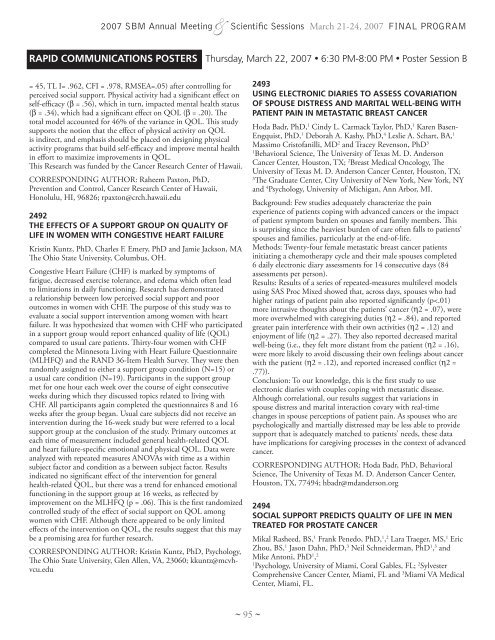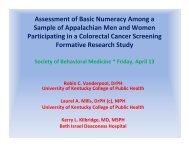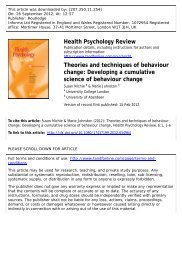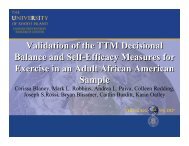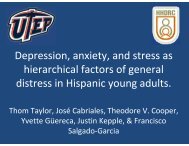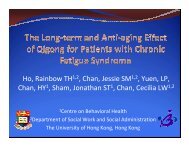2007 Final Program - Society of Behavioral Medicine
2007 Final Program - Society of Behavioral Medicine
2007 Final Program - Society of Behavioral Medicine
You also want an ePaper? Increase the reach of your titles
YUMPU automatically turns print PDFs into web optimized ePapers that Google loves.
<strong>2007</strong> SBM Annual Meeting & Scientific Sessions March 21-24, <strong>2007</strong> FINAL PROGRAM<br />
Rapid Communications Posters Thursday, March 22, <strong>2007</strong> • 6:30 PM-8:00 PM • Poster Session B<br />
= 45, TL I= .962, CFI = .978, RMSEA=.05) after controlling for<br />
perceived social support. Physical activity had a significant effect on<br />
self-efficacy (β = .56), which in turn, impacted mental health status<br />
(β = .34), which had a significant effect on QOL (β = .20). The<br />
total model accounted for 46% <strong>of</strong> the variance in QOL. This study<br />
supports the notion that the effect <strong>of</strong> physical activity on QOL<br />
is indirect, and emphasis should be placed on designing physical<br />
activity programs that build self-efficacy and improve mental health<br />
in effort to maximize improvements in QOL.<br />
This Research was funded by the Cancer Research Center <strong>of</strong> Hawaii.<br />
CORRESPONDING AUTHOR: Raheem Paxton, PhD,<br />
Prevention and Control, Cancer Research Center <strong>of</strong> Hawaii,<br />
Honolulu, HI, 96826; rpaxton@crch.hawaii.edu<br />
2492<br />
THE EFFECTS OF A SUPPORT GROUP ON QUALITY OF<br />
LIFE IN WOMEN WITH CONGESTIVE HEART FAILURE<br />
Kristin Kuntz, PhD, Charles F. Emery, PhD and Jamie Jackson, MA<br />
The Ohio State University, Columbus, OH.<br />
Congestive Heart Failure (CHF) is marked by symptoms <strong>of</strong><br />
fatigue, decreased exercise tolerance, and edema which <strong>of</strong>ten lead<br />
to limitations in daily functioning. Research has demonstrated<br />
a relationship between low perceived social support and poor<br />
outcomes in women with CHF. The purpose <strong>of</strong> this study was to<br />
evaluate a social support intervention among women with heart<br />
failure. It was hypothesized that women with CHF who participated<br />
in a support group would report enhanced quality <strong>of</strong> life (QOL)<br />
compared to usual care patients. Thirty-four women with CHF<br />
completed the Minnesota Living with Heart Failure Questionnaire<br />
(MLHFQ) and the RAND 36-Item Health Survey. They were then<br />
randomly assigned to either a support group condition (N=15) or<br />
a usual care condition (N=19). Participants in the support group<br />
met for one hour each week over the course <strong>of</strong> eight consecutive<br />
weeks during which they discussed topics related to living with<br />
CHF. All participants again completed the questionnaires 8 and 16<br />
weeks after the group began. Usual care subjects did not receive an<br />
intervention during the 16-week study but were referred to a local<br />
support group at the conclusion <strong>of</strong> the study. Primary outcomes at<br />
each time <strong>of</strong> measurement included general health-related QOL<br />
and heart failure-specific emotional and physical QOL. Data were<br />
analyzed with repeated measures ANOVAs with time as a within<br />
subject factor and condition as a between subject factor. Results<br />
indicated no significant effect <strong>of</strong> the intervention for general<br />
health-related QOL, but there was a trend for enhanced emotional<br />
functioning in the support group at 16 weeks, as reflected by<br />
improvement on the MLHFQ (p = .06). This is the first randomized<br />
controlled study <strong>of</strong> the effect <strong>of</strong> social support on QOL among<br />
women with CHF. Although there appeared to be only limited<br />
effects <strong>of</strong> the intervention on QOL, the results suggest that this may<br />
be a promising area for further research.<br />
CORRESPONDING AUTHOR: Kristin Kuntz, PhD, Psychology,<br />
The Ohio State University, Glen Allen, VA, 23060; kkuntz@mcvhvcu.edu<br />
2493<br />
USING ELECTRONIC DIARIES TO ASSESS COVARIATION<br />
OF SPOUSE DISTRESS AND MARITAL WELL-BEING WITH<br />
PATIENT PAIN IN METASTATIC BREAST CANCER<br />
Hoda Badr, PhD, 1 Cindy L. Carmack Taylor, PhD, 1 Karen Basen-<br />
Engquist, PhD, 1 Deborah A. Kashy, PhD, 4 Leslie A. Schart, BA, 1<br />
Massimo Crist<strong>of</strong>anilli, MD 2 and Tracey Revenson, PhD 3<br />
1<br />
<strong>Behavioral</strong> Science, The University <strong>of</strong> Texas M. D. Anderson<br />
Cancer Center, Houston, TX; 2 Breast Medical Oncology, The<br />
University <strong>of</strong> Texas M. D. Anderson Cancer Center, Houston, TX;<br />
3<br />
The Graduate Center, City University <strong>of</strong> New York, New York, NY<br />
and 4 Psychology, University <strong>of</strong> Michigan, Ann Arbor, MI.<br />
Background: Few studies adequately characterize the pain<br />
experience <strong>of</strong> patients coping with advanced cancers or the impact<br />
<strong>of</strong> patient symptom burden on spouses and family members. This<br />
is surprising since the heaviest burden <strong>of</strong> care <strong>of</strong>ten falls to patients’<br />
spouses and families, particularly at the end-<strong>of</strong>-life.<br />
Methods: Twenty-four female metastatic breast cancer patients<br />
initiating a chemotherapy cycle and their male spouses completed<br />
6 daily electronic diary assessments for 14 consecutive days (84<br />
assessments per person).<br />
Results: Results <strong>of</strong> a series <strong>of</strong> repeated-measures multilevel models<br />
using SAS Proc Mixed showed that, across days, spouses who had<br />
higher ratings <strong>of</strong> patient pain also reported significantly (p


